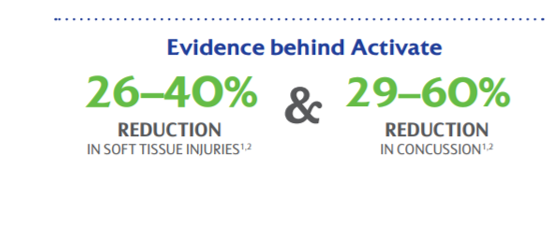Interventions to reduce risk
This section briefly describes two interventions which have been successfully implemented which in turn showed a subsequent decrease in the incidence of injury.
Hislop and colleagues in 2017 studied 3,188 age grade players ranging from 14 to 18 years old. This was a robust study which consisted of 118 teams across 40 independent schools. The intervention spanned pre-season (2-3 weeks) and in-season (10-12weeks) periods. The intervention programme comprised of balance training, whole-body resistance training, plyometric training along with a controlled rehearsal of landing and cutting manoeuvres. The authors reported that in line with their preventative movement control exercise programme, match injury outcomes were reduced, including the incidence of concussion. The authors noted that for greatest injury risk reduction impact the programme should be completed at least three times per week.
Figure 5. "Activate" has been shown to result in a reduced incidence and risk of injury.

The next intervention is that of Attwood and colleagues in 2017 using male adult players across 81 rugby clubs. The authors implemented an intervention programme which focused on proprioception, balance, cutting, landing and resistance exercise – like that of Hislop et al (2017). The study found a likely beneficial difference in injury incidence with a 40% reduction in lower limb injury incidence and a 60% reduction in the incidence of concussions. The importance of compliance was also highlighted in this study stating that it was associated with reduced targeted injury incidence and burden. Both intervention studies provide confidence to the coach to create warm-up practices that include:
- single leg balance exercises
- whole body resistance training
- plyometric training emphasising landing and take-off mechanics
- change of direction and cutting drills.
Crucially, ensuring these exercises and drills are completed at each training and practice session over the pre-season and in-season periods seems to be important in effectively reducing a player’s risk of injury.
The results of this study informed World Rugby’s Injury Prevention Programme “Activate” which is now being rolled out across our member unions and regional associations through our network of Licenced Educators and Trainers. For further information on World Rugby’s Activate programme please visit https://passport.world.rugby/coaching/activate-injury-prevention-exercise-programme